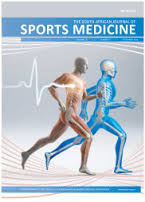Objective sleep patterns and validity of self-reported sleep monitoring across different playing levels in rugby union
DOI:
https://doi.org/10.17159/2078-516X/2020/v32i1a8456Abstract
Background: Growing evidence highlights that elite rugby union players experience poor sleep quality and quantity which can be detrimental for performance.
Objectives: This study aimed to i) compare objective sleep measures of rugby union players between age categories over a one week period, and ii) compare self-reported measures of sleep to wristwatch actigraphy as the criterion.
Methods: Two hundred and fifty-three nights of sleep were recorded from 38 players representing four different age groups (i.e. under 16, under 18, senior academy, elite senior) in a professional rugby union club in the United Kingdom (UK). Linear mixed models and magnitude-based decisions were used for analysis.
Results: The analysis of sleep schedules showed that U16 players went to bed and woke up later than their older counterparts (small differences). In general, players obtained seven hours of sleep per night, with trivial or unclear differences between age groups. The validity analysis highlighted a large relationship between objective and subjective sleep measures for bedtime (r = 0.56 [0.48 to 0.63]), and get up time (r = 0.70 [0.63 to 0.75]). A large standardised typical error (1.50 [1.23 to 1.88]) was observed for total sleep time.
Conclusion: This study highlights that differences exist in sleep schedules between rugby union players in different age categories that should be considered when planning training. Additionally, self-reported measures overestimated sleep parameters. Coaches should consider these results to optimise sleep habits of their players and should be careful with self-reported sleep measures.
Downloads
Downloads
Published
Issue
Section
License
The South African Journal of Sports Medicine reserves copyright of the material published. The work is licensed under a Creative Commons Attribution 4.0 (CC BY 4.0) International License. Material submitted for publication in the South African Journal of Sports Medicine is accepted provided it has not been published elsewhere. The South African Journal of Sports Medicine does not hold itself responsible for statements made by the authors.
How to Cite
- Abstract 884
- PDF 485
Metrics

- Citations
- Citation Indexes: 2
- Usage
- Full Text Views: 157
- Abstract Views: 41
- Captures
- Readers: 21





.png)